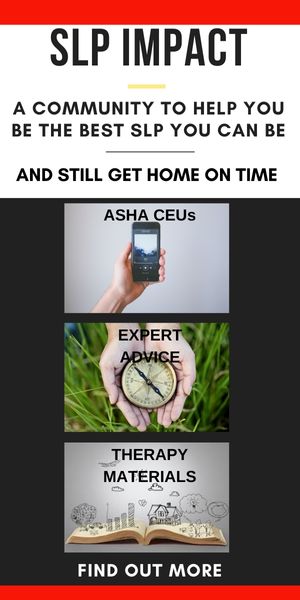You will be an awesome SLP.
Keep going.
Go back into the therapy room.
Apply again.
You are enough.
You gave him a voice today.
Ask for help.
You are learning, and that’s okay.
You are a great SLP.
It was the winter of 2002 in Wisconsin, and I was sitting with my clinical supervisor in a sterile office. I just wrapped up my therapy session with my five-year-old client, an energetic child with Down Syndrome. Truth be told, I thought the session went well—the child made progress on her articulation and language goals. And, we had a good time. She laughed, made requests and commented during the play-based therapy session. Now, it was time to review my session and submitted report for the child with my practicum supervisor. She began to talk, and here were her points:
You said, “Good girl!” Don’t you think that’s condescending to the child?
You should not have….
Next time, you should think about….
I remember sitting there thinking that I did such damage to the child. And, based on the feedback, I did not carry out any actions that would warrant a graduate degree to become a speech-language pathologist. Then, my report was reviewed. I was handed the pages of my report, and I saw red, red, red. Then, she spoke again. “You made so many errors on noun-verb agreement. This is probably because English was not your first language. This is not acceptable. Reports cannot look like this.” So, I swallowed her words, and I believed them. I began to think that I made an error. I would not be a worthy contributor in my chosen profession.
“You get old and you realize there are no answers, just stories.” – Garrison Keillor
Here is where this story changes. You see, a decade and a half later, I understand that my desire in becoming a speech language pathologist outweighed my supervisor’s commentary and beliefs. Only I can determine my SLP-success—with the help of those who believed in the art of learning and changing and getting better. And, thank you to those in the field (Dr. Jon Miller, Trici Schraeder, and Julie Schwellenbach) who provided the foundation for my footing and my professional journey. I will say that there are days when doubt finds her way into my inner dialogue. And, in those moments, I validate my uncertainty, believe in our craft and get back to our important work.
Becoming a Speech Language Pathologist is Worth the Effort
So, SLPs, we will continue to persist. I promise it will be worthwhile, and I am sure those we support will vehemently agree.
Also read…





Thanks for sharing this, it brought back memories, i had a professor and a supervisor who contributed to a similar situation but i persisted and I also had professors and other supervisors who believed in me. This is an amazing field and I wouldn’t dream of being anywhere else, I’m currently trying to get certification as a NICU slp. Thanks for your blog. Much love, Adilla
Adilla, thank you so much for your comment and feedback. It makes me grateful for those who tenaciously support our endeavors to be a part of this awesome field. Good luck as you obtain your certification to be a NICU nurse. From a personal experience, my third baby was born approximately 2 months early in 2015. I was able to see how our field can make such an important impact for our youngest and most fragile clients. Baby Story, now 17 months, is eating well, constantly talking and continually reminds us the fruits of our profession. Take care, Adilla. And, thank you for being a part of this field. – Phuong
Oh Phuong, you are telling my story too. I had an evaluation report COVERED in red marks during my last semester of grad school. My GPA was lower than most of my grad school mates. Even though it was a relatively high GPA for grad school because that’s just how SLPs are, it wasn’t as high as others so I had self-doubt for a long time. I took that marked up report to a clinical supervisor I respected who said it was good and that the original supervisor was ridiculously critical, but that didn’t make me feel much better. Remember my story is that I went home my first day of work (like 3 hours after I got there) because I just didn’t think I could do this SLP thing and I certainly couldn’t do anything worthwhile with all of these different cultures and languages at my school. I’m monolingual. What am I going to do with Spanish, Vietnamese, Laotian? Grad school forgot to mention that part. You know the current chapter of my story. I always say that grad school teaches you the foundation of your profession and experience builds your house. I have a really nice house now and feel really good about it. If I can do it, anyone can.
I loved what you said, Gina. Grad school teaches you the foundation of your profession and experience builds your house. It’s so true. There’s a lot to be said for continually learning, believing YOU CAN and just living the day-to-day of the SLP-life.
Hello, I’m currently a freshman in college. I have recently become interested in studying speech-language pathology, occupational therapy, or physical therapy. To be honest, I’m leaning towards speech-language pathology; however, I’m not sure if this career is right for me. Because English was not my first language, I have a slight accent and my grammar is not perfect. In addition, speech-language pathology is a relatively new field in Vietnam so whenever I tell my family and friends that I want to major in speech-language pathology, they would ask me what it is. I would like to ask you a few questions.
1. When did you first learn about speech-language pathology?
2. Why did you choose to pursue speech-language pathology as your career?
3. Do you have a hard time explaining what speech-language pathology is to those who have no clue what it is?
4. What makes a gooe SLP?
Best regards,
Sang
Hello Sang,
Thank you so much for your comment. First, I will say that as someone who is a native Vietnamese speaker, you will be such a tremendous asset to our field! Vietnamese is my native language, as well, and there are not enough of us. For example, in the state of Texas, it’s is the 3rd most common language, and there are only 7 of us in the state (that I am aware of). Second, I personally feel that the way in which you speak should be honored and valued. Your experiences and perspective as a bilingual individual will yield much impact in our field. In saying that, I will say that it will be important to gain more knowledge with regard to how to differentiate between a speech/language difference (natural outcomes when learning a 2nd language) versus a true speech/language disorder (that is demonstrated in the student/client’s native language). Here are some thoughts regarding your questions:
1. My closest friend growing up was an individual who stutters. Though his experiences, I found great value in 1) supporting the communication needs of others and 2) engaging in a profession that supports fellow humans.
2. I feel that I have the best job in the entire world. I am a part of someone’s communication journey (verbal and non-verbally through communication devices), and communication is VITAL. I am able to help people communicate their wants, rejections, ideas and social needs. What I do in my profession directly impact quality of life, and this is essential for individuals. For example, I am able to obtain a communication device for a young adult, give him the means to ask for his favorite meal and share in the excitement when his mother tells me she heard him say “I love you” for the first time. This is what we do as speech-language pathologists.
3. From a global perspective, this is fairly a new field. I tell people in a few sentences about what I do, and I am always praised for the goals of our profession. I usually say, “I help children/adults to communicate. Sometimes I help with making sounds. Other times I help them put together words and sentences verbally or with a communication device. I also support the social skills’ needs of my clients.”
4. This is a great question, and I only answer from my personal experiences. As someone who has supported groups of speech-language pathologists, here are the characteristics that have yielded positive outcomes: value of helping those find their voice, kindness and passion for fellow humans, knowledge of evidence-based practices, considerations for family/teacher relationship and potential involvement, ability to collaborate with fellow team members and professions and flexible thinking. The beauty of this profession is that you can find a professional fit that best fits your individual needs. You can work with different demographics, different settings and different arenas of communication.
Good luck as you make decisions regarding your future. Thank you for considering this profession. I am happy to talk to you more about it. I can be reached at [email protected].
Take care,
Phuong